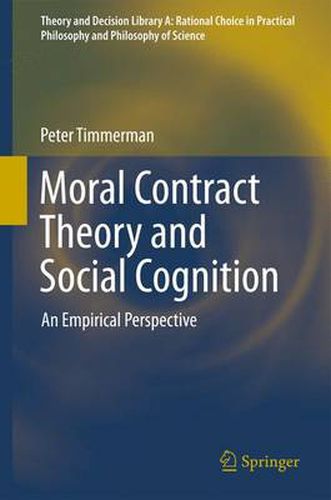Readings Newsletter
Become a Readings Member to make your shopping experience even easier.
Sign in or sign up for free!
You’re not far away from qualifying for FREE standard shipping within Australia
You’ve qualified for FREE standard shipping within Australia
The cart is loading…






This title is printed to order. This book may have been self-published. If so, we cannot guarantee the quality of the content. In the main most books will have gone through the editing process however some may not. We therefore suggest that you be aware of this before ordering this book. If in doubt check either the author or publisher’s details as we are unable to accept any returns unless they are faulty. Please contact us if you have any questions.
This interdisciplinary work draws on research from psychology and behavioral economics to evaluate the plausibility of moral contract theory. In a compelling manner with implications for moral theory more broadly, the author’s novel approach resolves a number of key contingencies in contractarianism and contractualism. Acting in accordance with principles that we could all agree to under certain conditions requires that agents are capable of taking up the perspectives of others. Research in social and developmental psychology shows just how challenging this can be. The author discusses in detail what implications findings on perspective-taking have for contract theory. He concludes with cautious optimism that, despite our limitations, it lies within our power to become better at perspective-taking and to adopt a contractarian or contractualist mode of moral thinking. This does however require us to be much more attentive to the standpoints of others than we tend to be. Contract theorists also assume that agents can be moved to comply with principles that would be the object of agreement, with some arguing they can be so moved out of their own interest. The book show that, in contrast to the suspicion of many philosophers, this idea is largely supported by research on the dynamics of trust and our ability to distinguish trustworthy from untrustworthy others. Bringing a welcome dose of realism to the debate on contract theory, the author shows the value of assessing moral theories from an empirical perspective.
$9.00 standard shipping within Australia
FREE standard shipping within Australia for orders over $100.00
Express & International shipping calculated at checkout
This title is printed to order. This book may have been self-published. If so, we cannot guarantee the quality of the content. In the main most books will have gone through the editing process however some may not. We therefore suggest that you be aware of this before ordering this book. If in doubt check either the author or publisher’s details as we are unable to accept any returns unless they are faulty. Please contact us if you have any questions.
This interdisciplinary work draws on research from psychology and behavioral economics to evaluate the plausibility of moral contract theory. In a compelling manner with implications for moral theory more broadly, the author’s novel approach resolves a number of key contingencies in contractarianism and contractualism. Acting in accordance with principles that we could all agree to under certain conditions requires that agents are capable of taking up the perspectives of others. Research in social and developmental psychology shows just how challenging this can be. The author discusses in detail what implications findings on perspective-taking have for contract theory. He concludes with cautious optimism that, despite our limitations, it lies within our power to become better at perspective-taking and to adopt a contractarian or contractualist mode of moral thinking. This does however require us to be much more attentive to the standpoints of others than we tend to be. Contract theorists also assume that agents can be moved to comply with principles that would be the object of agreement, with some arguing they can be so moved out of their own interest. The book show that, in contrast to the suspicion of many philosophers, this idea is largely supported by research on the dynamics of trust and our ability to distinguish trustworthy from untrustworthy others. Bringing a welcome dose of realism to the debate on contract theory, the author shows the value of assessing moral theories from an empirical perspective.